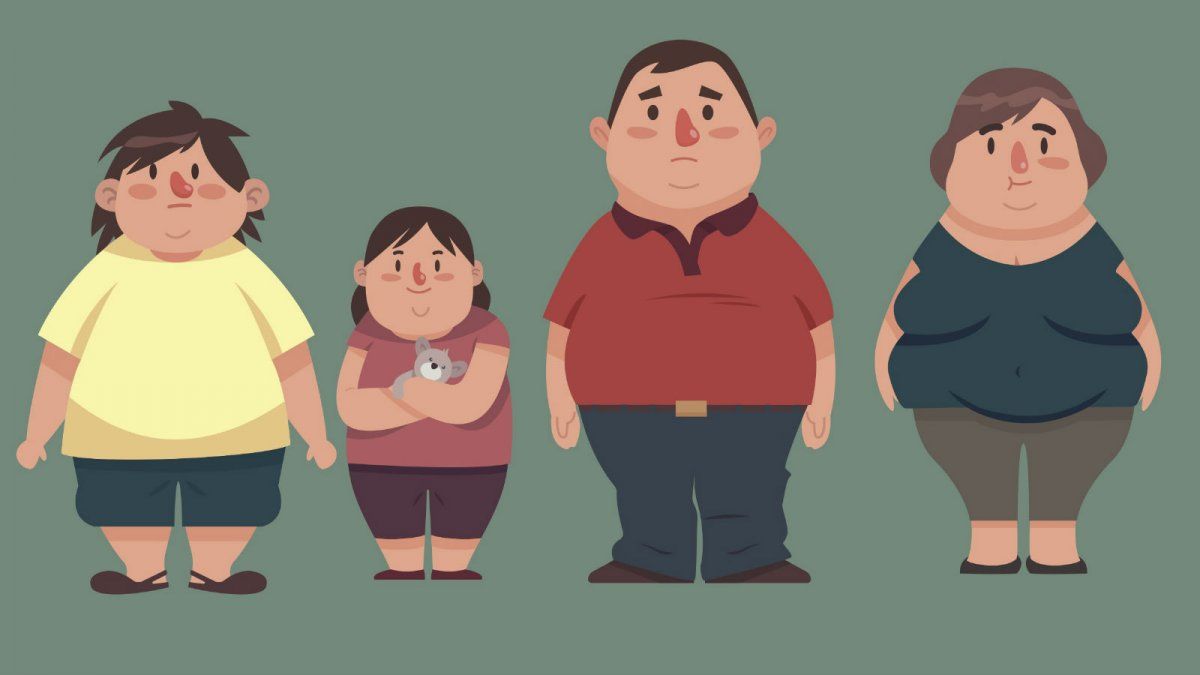This is because obesity is a chronic multicausal disease and also produces low-grade chronic inflammation due to the increase in dysfunctional body fat. Fat tissue in the Body It is one more organ that has functions: it produces hormones and other substances that regulate the energy balance in the body.
Fat tissue grows and increases in number of adipocytes or fat cells, especially after birth and in pre-puberty. Then, in adulthood, the formation of new adipocytes is lower, this depends on normal cell turnover and also occurs in response to chronic overeating.
When the fat cell exceeds its ability to store fat (this is called adipocyte capacitance), when it becomes saturated, that cell that is over-distended no longer works properly and then begins to manufacture substances that generate inflammation in the body. In addition, it releases its internal fat content that can be deposited in other organs that cannot metabolize that excess fat and this generates toxicity. That is when different problems begin to appear in the rest of the organs.
For example, when excess fat is deposited in the muscle this generates insulin resistance (it does not capture glucose properly). On the other hand, in the pancreas the B cells that make insulin become fatigued and in the liver glucose production increases and does not work properly. All this leads to an increase in blood glucose and diabetes, the famous metabolic syndrome.
According to a survey by the Argentine Society of Nutrition, in April and May 56% of Argentines gained weight during the quarantine. According to this survey, in this group almost 80% said they had gained between one and three, 18% had a weight gain of between 3 and 5 kilos and 3.5% gained more than 5 kilos in a month.
During this pandemic, prolonged isolation has generated fear, anguish and anxiety and, at times, reduced the desire for healthy food. All these factors also exacerbated the other pandemic, obesity.
Spending more hours at home makes us more sedentary, but, in addition, confinement can generate arguments or conflicts, anxiety and, in some cases, depression. This stressful situation can be reflected in an increase in intake: we go to the refrigerator more times and choose foods that provide us with more pleasure (fatty and sweet) and generally with higher caloric density.
Stress leads to weight gain because it decreases leptin (the hormone that curbs appetite) and stimulates ghrelin (which generates an increase in appetite and the desire to eat carbohydrates or flours and starches).
Also, the alteration of the sleep-wake cycle and staying up late watching series and eating at times when the body is not used to it causes desynchronization. If a meal is eaten in the morning outside of normal hours, this causes weight gain.
To control body weight, it is necessary to work on 3 fundamental areas: diet, physical activity and mental-psychological health. If we do not feel emotionally well, if our brain is not happy, it is difficult to disassociate the emotional from food, because food generates dopamine, a tricky neurotransmitter: because it lasts very little, it anticipates pleasure. Dopamine participates in motivation and reward for pleasant stimuli: it induces the repetition of behaviors that lead us to pleasure, such as food, sex and drugs.
We have to focus on generating an increase in serotonin in our body. Serotonin is a neurotransmitter that is produced in our brain and in various other places. Traditionally, it is known as the “neurotransmitter of happiness.” Serotonin is the main one in charge of regulating our mood, in the long term, and increasing our feeling of well-being and satisfaction.
Today there is another nutritional paradigm: we no longer count calories but we talk about satiety. We went from the light paradigm to a natural and thoughtful diet, from caloric control of weight to behavioral control.
Some advices:
- Avoid the estrIt issthrough meditation. Take a few minutes to organize your mind, to relax and listen to music, one of the greatest sources of pleasure.
- Thepositive thoughts they increase serotonin levels and lower cortisol, the stress hormone.
- Exercise:it is key to a healthy life, both physically and mentally. Exercise is a vital point in treating depression: it improves not only your cardiovascular health but also your mental health (it relaxes, facilitates thinking and helps to calm body aches).
- Exposing yourself to sunlight, mínimamente 10 minutesand we manufacture vitamin D in the skin which is important for making serotonin.
- Serotonin gives me satisfaction, and for this it is necessaryeat in a varied and balanced way. If we take a plate and divide it into 3 parts: one part proteins (meat, egg, legumes, tofu or seeds) another part vegetables and finally some starch or whole grain cereal (brown rice, potato or quinoa). If I add vegetable oil to the dish, I make sure it creates satiety. Flourless diets fail, there always has to be some starch or flour.
-Degree in Nutrition, diabetes educator and coordinator of the Comprehensive Weight Loss Program of the Center for Metabolic Research (CINME).

![[LPGA] Inbi Park, runner-up in VOA Classic… Stanford Championship [LPGA] Inbi Park, runner-up in VOA Classic… Stanford Championship](https://img6.yna.co.kr/mpic/YH/2020/12/07/MYH20201207010300641.jpg)
